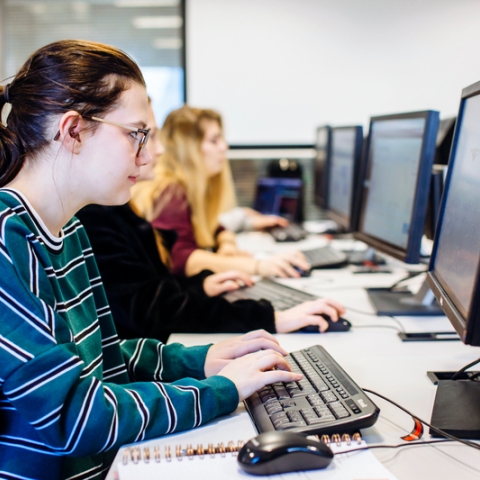
Sidebar navigation

Using computers
Explore some of the skills use working with computers while you study
Information communication technology (ICT) devices, apps and services can improve your learning, enhance your digital identity, and help you work more efficiently.
As a university student you'll need to be able to use a mouse, keyboard, touchscreen, voice control or other mode of computer input. You'll also need to use a screen, microphone, haptic feedback, or other mode of output, and be able to use Office software, a web browser and email.
As your ICT proficiency develops you'll be able to choose, adapt and personalise the apps and systems you use. You'll be able to assess the benefits and disadvantages of specific ICT approaches and could even design and implement ICT solutions or learn how to code.
Improving your understanding of digital technologies
You need to be willing to learn more about technologies you're already familiar with. As technology evolves, the opportunities to use it and the threats associated with it changes. Most of us would say that we 'know how to use email', but the following scenario, based on an event in August 2015, shows why continuous learning matters:
A London sexual health centre mistakenly leaked the details of nearly 800 patients who attended HIV clinics, bosses admitted. The 56 Dean Street clinic in Soho shared the names and email addresses of 780 people when a newsletter was issued to clinic patients. Patients were supposed to be blind-copied into the email but instead details were sent as a group email.
Being able to 'use email' may not be enough – you should understand how different kinds of email message are used to follow different procedures. In this case the email wasn't blind copied, which would prevent each recipient seeing who else the email had been sent to. Inappropriately sharing information can lead to embarrassment or worse. In this example patients may suffer discrimination as a result of their health status and private information being shared. Before you send an email to multiple recipients you should consider whether everyone on the list really needs to be copied in, and whether anyone needs to be blind copied.
Developing your ICT skills at university
You should be open to learning more about a technology you already know well. This is more important now that many services are hosted online and are updated constantly – Google Apps, a service that all University of Portsmouth network accounts can access, changes often.
Don't underestimate the value of revisiting some of the standard Office software, such as Microsoft Word. Learning the more advanced features of Word, such as referencing and bibliography management, can prove to be a huge timesaver when writing your coursework.
We offer students free hands-on IT training to help you develop your IT skills.


